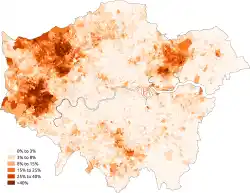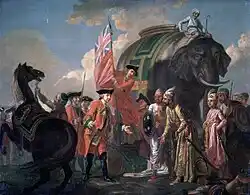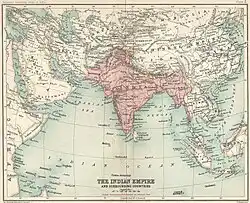
British Indian surnames are surnames which are held by people of Indian heritage within the United Kingdom. The English East India Company, the largest and most powerful corporation in history, colonized parts of India from the middle of the seventeenth century onwards. By the mid-nineteenth century the company had conquered all of the subcontinent. Direct control over it was established by the British crown and government following the Great Mutiny of 1857. British rule continued until 1947, when India and Pakistan became modern, independent nations. The contacts between Britain and India ensured that many Indian people migrated to Britain, particularly in the nineteenth and twentieth centuries. Today over two million British Indians live in the United Kingdom, making them the largest single ethnic minority in the country. British Indian surnames are very similar to Indian surnames, although some specific surnames are more common in Britain than they are in India. They also tend to be concentrated in particular urban conurbations in Britain like the cities of London and Birmingham.[1]
History of British Indian surnamesHistory of British Indian surnames

The history of British Indian surnames is strangely tied up with the story of an English trading company. The English East India Company was formed in London at the end of the year 1600 to begin developing English trade with the East Indies (broadly synonymous with modern-day Indonesia). In the course of the seventeenth century it tried to develop trade more broadly with Asia. This included acquiring a number of trading stations and colonies along the coastline of the Indian subcontinent, which in those days was divided into dozens of states and principalities. The English crown also acquire the island of Bombay (modern-day Mumbai) from the Portugal as part of the dowry when King Charles II of England, Ireland and Scotland married Catherine of Braganza in 1661.[2]
The East India Company entered a period of exponential growth following the Battle of Plassey and the conquest of Bengal in north-eastern India in 1757. Delhi fell to the British in 1803. By the middle of the nineteenth century, the subcontinent was completely under company control and they were even trying to expand north-westwards into Afghanistan and in the east into what was then known as Burma, but which we now call Myanmar. A Great Mutiny against Company rule in 1857, alongside financial mismanagement for decades, convinced the British government that it needed to take over direct control of what it now termed the British Raj in 1858. Queen Victoria was given the title of Empress of India in 1877.[3]

The conquest and colonization of India slowly led to individuals migrating to London from India. This was a very slow and limited process in the seventeenth and eighteenth centuries, involving no more than a few hundred people. Then, in the middle of the nineteenth century, with the advent of the steamships and mass migration, as well as the opening of the Suez Canal in Egypt in 1869, a growing flow of Indian migrants arrived to Britain. This continued into the twentieth century, though the numbers involved remained limited.[4]
Ironically it was only just as British rule over what became India and Pakistan upon the granting of independence in 1947 that Indian settlement in Britain really began to intensify. The British Nationality Act of 1948 stipulated that people from the British Commonwealth, an umbrella organization which aimed to continue ties between Britain and parts of its former empire that had acquired independence, could migrate to and live in the United Kingdom. This was part of efforts to bolster British worker numbers in the aftermath of the Second World War. Over time several hundred thousand Indian people moved to Britain from the subcontinent and the British Indian community grew. From around 25,000 people at the time of independence in 1947, the British Indian population expanded to 80,000 in 1960, then around 350,000 in 1970 and nearly one million by the end of the twentieth century. Today the British Indian community is believed to be just over two million strong, with large concentrations in cities like London, Birmingham and Manchester. As this has happened, British Indian surnames have abounded in the United Kingdom.[5]
British Indian naming conventionsBritish Indian naming conventions
British Indian surnames are quite similar to Indian surnames. Many of them reflect Hindu tradition and evolved as part of the caste system. Others are colonial constructs and mirror European surname traditions. Thus, we find surnames that are occupational and topographical, and others that indicate one’s descent from a male ancestor of one name or another. Inevitably, given the sheer size of India and its historical and cultural variety, certain surnames are associated with different traditions and regions. Patel, for instance, is a surname which is derived from the Hindu caste system, indicating a village headman. It is especially synonymous with the Gujarat region in north-western India. This regionalism is important in the evolution of British Indian surnames, as Indian migration to Britain since the 1940s has been particularly intense from certain specific areas of India like Gujarat in the northwest and Bengal in the northeast. What this means in practice is that certain surnames like Patel are more common as British Indian surnames than they are as Indian surnames at home in India as a whole.[6]
Common British Indian surnamesCommon British Indian surnames
- Patel – As noted, Patel is a name for a village headman or prominent individual, especially in Gujarat. It is the most common British Indian surname, held by over 100,000 British Indians (more than 5% of the British Indian community).[7]
- Singh – A common surname amongst the Sikh community of the Punjab region along the modern-day border between India and Pakistan. It basically means ‘lion’ and is the second most common British Indian surname after Patel.[8]
- Kumar – This is a generic surname or middle name common in northern India. It means ‘son’ or ‘child’ or even ‘prince’.[9]
- Kaur – This is the female equivalent of Singh amongst the Sikh community that has made up a disproportionately large percentage of the British Indian community in the UK. Singh and Kaur were adopted in a widespread way by the Sikh community under British rule as surnames abounded for the first time in certain parts of India.[10]
Famous People with British Indian SurnamesFamous People with British Indian Surnames
- Dev Patel – A well-known British actor who first came to attention after starring in Slumdog Millionaire. He was born in London to Indian parents from the Gujarat region.[11]
- Krishnan Guru-Murthy – A broadcast journalist and presenter who works primarily for Channel 4. His parents were part of the huge influx of Indian immigrants to Britain in the 1960s to make up the labor shortfall in the post-war decades.[12]
- Rishi Sunak – Sunak was briefly Prime Minister of the UK between late 2022 and the summer of 2024. His parents are of Punjabi heritage, though they came to Britain via East Africa.[13]
- Baroness Sharmishta Chakrabarti – A British human rights lawyer and politician with the Labour Party. She was born in London to parents of Bengali heritage.[14]
See alsoSee also
Explore more about British Indian surnamesExplore more about British Indian surnames
- United Kingdom, Naturalisation Certificates and Declarations records collection on MyHeritage
- England & Wales, Birth Index, 1837-2005 records collection on MyHeritage
- England Births and Christenings, 1538-1975 records collection on MyHeritage
- England & Wales, Marriage Index, 1837-2005 records collection on MyHeritage
- England Marriages, 1538-1973 records collection on MyHeritage
- United Kingdom Deaths, 1980-2024 records collection on MyHeritage
- England & Wales, Death Index, 1837-2005 records collection on MyHeritage
- England, Telephone Directories records collection on MyHeritage
- United Kingdom, Names & Stories in Newspapers from OldNews.com records collection on MyHeritage
References
- ↑ https://www.indiandiaspora.org/index.php/news/history-indian-diaspora-uk
- ↑ https://thehistorypress.co.uk/article/charles-ii-and-catherine-of-braganza-a-loveless-marriage/
- ↑ William Dalrymple, The Anarchy: The Relentless Rise of the East India Company (London, 2019).
- ↑ Dilip Hiro, ‘Indians in Britain’, in India International Centre Quarterly, Vol. 6, No. 3 (July, 1979), pp. 217–224.
- ↑ https://www.bbc.co.uk/history/british/modern/independence1947_01.shtml
- ↑ https://www.hindustantimes.com/world-news/patel-singh-among-most-common-surnames-in-uk-ireland/story-LFK1ID6iXpidmePE9GRRyL.html
- ↑ https://www.hindustantimes.com/world-news/patel-singh-among-most-common-surnames-in-uk-ireland/story-LFK1ID6iXpidmePE9GRRyL.html
- ↑ https://www.thoughtco.com/singh-last-name-meaning-and-origin-1422623
- ↑ https://surnamedb.com/Surname/kumar
- ↑ https://www.thecollector.com/history-why-are-sikh-names-singh-and-kaur/
- ↑ https://www.britannica.com/biography/Dev-Patel
- ↑ https://www.esu.org/krishnan-guru-murthy/
- ↑ https://www.bbc.com/news/uk-63345272
- ↑ https://freedomunderlaw.org/board-member/the-rt-hon-the-baroness-chakrabarti-cbe/

